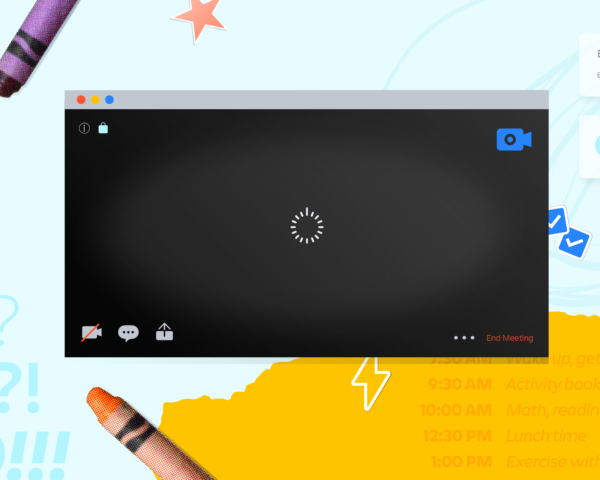Work-life balance is so elusive that some commentators are actually starting to suggest we abandon our pursuit of it. They point to studies claiming that a person’s work-life balance only changes for the better when their bosses want it to. They say it’s simply too hard for one person to re-shape an entire office’s culture – so why even try?
Well, dear reader, this article is for those of us who are not so easily defeated.
Work-life balance means having the motivation, time, and resources to do well both at work and in your personal life. Some people aim to be equally work- and personally-focused, while others find that emphasizing one or the other actually helps them achieve equilibrium.
While it may be true that company culture starts at the top, the idea that we need our boss’ permission to happiness-hack our lives is so disempowering, it’s almost insulting. Because real talk: we’re not victims. When we feel a work-life imbalance, it has a lot (though not everything) to do with the choices we make and the habits we’ve formed. That’s the “bad” news. The good news is that we can form new, better habits. And, chances are, make some new and different choices.
Why does work-life balance matter?
Burnout is real and does real damage to workers and the people close to them. It can be caused both by overwork and by heavy burdens at home, but most often, it’s work. People who work more than 48 hours each week have been shown to experience significantly more anxiety and depressive episodes than people who work 47 or fewer hours. Think about the ripple-effects of that: a tense home environment, low morale at work, missed swim meets. Not to mention the negative effects of stress on sleep and physical health.
Thankfully, employers are realizing that a sustainable work-life balance is actually good for business. Bottom line? When you’re stretched too thin, you’re not as effective at work. By contrast, a healthy work-life balance has been shown to reduce absenteeism and improves employee engagement. This means that if you ask your boss for a more flexible schedule or an extension on a deadline in order to avoid burnout, they’ll probably be open to discussing it at the very least. Given the current low unemployment rates that are making employers compete ever-harder for talent, promoting work-life balance is even starting to factor into recruiting strategies.
Three increasingly common causes of work-life imbalance
Misplaced self-identity
Did you know it’s possible to love your job a little too much? It’s true. And what a bizarre paradox! As much as you might hate the toll those long hours take, it’s an indication that you’re passionate about your work. If we all hated our jobs, work-life balance wouldn’t be such a struggle.
People at mission-driven companies or non-profits sometimes care so much about the work they’re doing on behalf of others, they forget to extend that same care to themselves. When the mission becomes a core part of who you are, it’s easy to ignore or willfully suppress your other identities as a friend, partner, parent, caregiver, snowboarder, cat-lady, film buff… you name it.
Nobody is entirely safe from over-identifying with their job, though. Think about how we introduce ourselves at parties. I may not bust out with “Hi, I’m Sarah and I’m a writer,” but I can damn-near guarantee the first question out of the other person’s mouth is “So, what do you do?” And you know they’re not asking how I enjoy my time on the weekends. Even in social situations, we tend to judge each other’s worthiness by what we do for a living. (Which is kind of gross, but there it is.) No wonder we have trouble leaving work at work.
Technology
Wait a sec: wasn’t all this technology supposed to make our lives easier? It gives us the flexibility to work from home, answer emails while Junior is in the dentist’s chair, and see the latest headlines any time of day or night. All of which is great – to a point.
Before we know it, we’re thumbs-deep in always-on culture. Answering the occasional email after hours is fine, but letting that become the norm sets unhealthy expectations with your coworkers about response times and contributes to chronic stress and emotional exhaustion. Eventually, we stop feeling like we ever really leave work because it follows us home. And everywhere else we go. Even on date-night.
Parenting responsibilities
A top family-related predictor of work-life imbalance is being a parent. No surprise, right? It’s just that much harder to immerse yourself in career-defining projects when your three-year-old has to be picked up from daycare by 5:30. And as much as dads are stepping up to help with the kids and the chores these days, many of the companies they work for haven’t gotten hip to the times yet. They still see the ideal worker as someone who is unencumbered by caregiving or household responsibilities. That’s a stressful corporate culture for dads to be in.
As of 2010, 64 percent of women with kids under age six, and 77 percent of women with elementary- through high school-aged kids, worked outside the home where they often face the same outdated attitudes about what an ideal worker looks like. Inside the home, they’re more likely to be the parent responsible for chores like cooking and helping with homework. Since you can’t necessarily save those tasks for the weekend, moms tend to have to wedge household tasks in around their working hours.
Tips and emerging trends that aid your quest for work-life balance
The whole point of seeking balance is to reduce stress. So forget about the old way of achieving balance: packing more and more items into the grocery bag that is your life as if you’re playing some warped version of Tetris. Just when you’ve got everything tucked neatly inside, you start wondering how long that bag can hold. Actually, you’re convinced the bottom is going to give out the moment you try to fit something else in. Not exactly a recipe for a low-stress life.
The new, more sustainable approach is to take a look inside yourself first and work outward, rather than slavishly absorbing every little thing the world throws at you, then struggling to metabolize it all. What are your goals, values, and priorities? What trade-offs are you willing to make? If your life was a blank slate, where would you draw the line between work and everything else?
Take a moment to think about your answers to those questions. (Go ahead, I’ll wait.) Now, look at these five work-life balance tips through that lens.
1. Re-examine your definition of success
This does not mean “settling” for less than you deserve. Rather, it means taking a holistic view of what a successful, fulfilling life can be. Maybe you define success as a tight relationship with your family and an active role in community groups. Maybe it’s the freedom to be a digital nomad. Maybe it turns out you really do want a three-car garage and that corner office. It’s all good.
Knowledge workers in particular often feel like they’re in competition with each other. And “winning” usually requires longer hours, if not chronic overwork. But if your personal definition of success doesn’t revolve around your investment portfolio or a spot in the C-suite, you can give yourself permission not to engage in workplace competition. Or, engage less.
TRENDY TIP
Create a vision board (formerly known as “a collage”) with words and pictures depicting your idea of a successful life, and hang it somewhere you’ll see it often.
2. Make digital detoxing a habit
The negative effects of an always-on workplace culture and overexposure to social media are pretty well documented at this point. This is welcome news for anyone trying to justify ignoring the work-related pings on your phone at 9:30 pm, and a sign that always-on culture may be on the decline.
While you may not yet be able to punt on after-hours pings entirely, you can certainly reduce the amount of time you spend surfing social media and news sites, which can improve your sense of well-being. Plus, digital detoxing helps you carve out time for hanging out with people you love IRL and all the other offline activities you find fulfilling.
TRENDY TIP
Skip the apps intended to help you stop using all the apps on your phone. (Ironic, no?) Successful digital detoxers are opting to simply turn their devices off for periods of time or create sacred spaces in their homes where phones are not allowed.
3. Emphasize progress over perfection
Perfectionism has surged in recent years as air-brushed versions of other people’s lives came to dominate our Facebook and Instagram feeds. The more we compare our own messy, flawed, real-human lives to the color-filtered pictures in our feeds, the more inferior we feel. (This is what experts call “socially-prescribed” perfectionism.) But we’re starting to wake up from our collective nightmare and realize that it’s ok to order pizza when we’re just too tired to cook an artisanal, locally-sourced meal for dinner. And it’s ok to have friends over when there’s laundry hanging off the back of the couch and an ankle-deep sea of Legos on the floor.
So even if things aren’t perfect, don’t let that stop you from enjoying all the good things about your life and career. For that matter, don’t be a perfectionist about your work-life balance, either. If (ok: when) things get out of hand, adjust your schedule or commitments until you feel steady on your feet again. The main thing is that you’re improving what you can and making progress on your work-life balance over the long term.
TRENDY TIP
Embrace the authentic “you”. Show up in the world as-is and don’t let the judgments of others have too much power over your sense of self-worth.
4. Join forces with family, friends, and neighbors
This is literally the oldest work-life balance trick in the history of the world! As the dominant household structure shifted from extended families to nuclear families in the 20th century, we started to feel embarrassed about relying on anybody but ourselves. We forgot how healthy is it to live in community. Our parents, siblings, and cousins might live thousands of miles away now, but we can still come together with a “chosen family” of friends and neighbors.
Collaborating on meals and carpools not only provides logistical relief, it also provides a chance to celebrate little victories and cry on each other’s shoulders. The emotional healing that comes from these seemingly trivial, every-day interactions goes a long way when we’re feeling stressed.
TRENDY TIP
Start a dinner collective. A no-frills, come-as-you-are potluck feeds both the body and the soul. You might even score some tasty leftovers!
5. Make time for self-care when you can
You know how airline safety videos tell you to secure your own oxygen mask before assisting others? That same idea applies to your work-life balance. A cared-for you will be a more effective colleague. Don’t be afraid to remind your team of that if you opt to skip happy hour and take time for yourself instead. Likewise, you’ll be a better roommate, partner, parent, and friend. Own that.
It’s not as if you’ll turn over the sofa cushions and says “Look! I found some time!” But if activities like exercise, meditation, or prayer have a restorative effect on you, do your best to carve out time for them. Then guard that time with your life.
TRENDY TIP
Be your own “accountability buddy”. Your well-being is just as important as any client visit or doctor’s appointment. Block out time on your calendar for self-care as a way of holding yourself to account.
To each their own
Everyone finds their own unique version of work-life balance. It’s not about giving your job and the rest of your life equal time and attention, it’s about doing things in the right proportions for you. And what feels sustainable will evolve over time.
Major life changes like going back to school, starting a family, building up your savings, or switching jobs can turn your world upside down for a minute. Don’t panic. It’s ok to consciously choose a temporary imbalance when you’re pursuing a big goal. Just make sure you have an idea of how and when you’ll get yourself back to equilibrium.









































